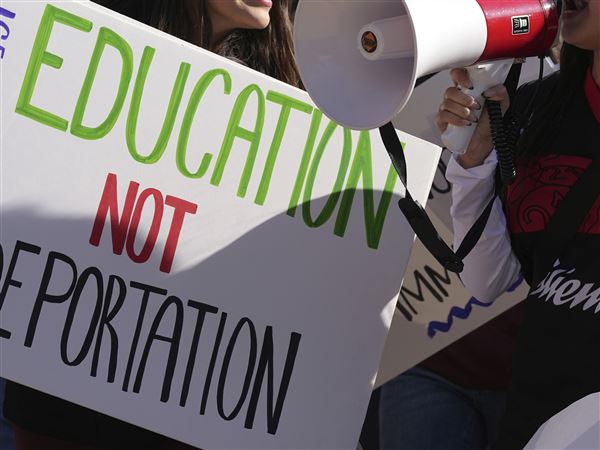The board for the financially troubled Penn Hills School District has approved a $97 million budget balanced with a 0.65-mill tax increase, a $12 million short-term loan and staff cuts.
The 6-1 vote came Monday night, a day before the state-mandated deadline for school district budgets. The budget contains $87.8 million in costs and $97 million in revenue. Pauline Calabrese was the single dissenting vote .
The real estate tax rate for the new school year was set at 24.80 mills, an increase of 0.65 mills over last year. The increase is the maximum allowed by the state index. The tax hike will cost a homeowner an additional $30 on a house with a value of $50,000.
The district’s short-term loan from PNC Bank must be paid back in 90 days. The loan will pay day-to-day expenses.
The district had offered an early retirement offer, without a cash payout, to cut expenses. Ten employees accepted the offer, which the distsrict considered only partially successful because it had expected more to do so.
That left the district about $2 million short of projected cost savings. In all, the board approved the retirement or resignation of 18 employees, including three teachers on Monday.
The district is also attempting to renegotiate its transportation contract with AJ Myers and Sons, which was over budget by nearly $4 million this year.
Directors said the district will offer an $18 million bond issue in September and plans to use the proceeds to pay back the PNC loan. Moody’s Investment Services has downgraded Penn Hills School District twice since March 2013. Currently, the school district has a BA3 rating and a negative outlook. In April, Moody’s summed up Penn Hills’ financial straits in these terms:
“We expect that the district will continue to depend upon state assistance to make future debt service payments for the near term given its declining credit fundamentals, which include weak governance, a willingness to risk default on general obligation bonds, and large and growing budgetary pressures driven by charter school enrollment, a high debt burden, and already heavy pension contributions.”
Some residents questioned the financing plan.
”What is the status of the bond issue?” asked Bob Marra of Rushmore Drive. “Is it right to include those numbers in this budget if that money is not yet secured?”
“I am tired of hearing that you didn’t know about this deficit,” Mr. Marra told the board. “You signed off in January on a financial report from July 2014 that showed a negative $8.9 million fund balance. You signed off on these reports every month. Either you didn’t read the reports or you are sitting there lying.”
As Mr. Marra handed board president Denise Graham-Shealy a copy of the July 2014 financial report, the audience applauded.
Others in the audience questioned whether the bond issue will be successful given the district’s credit ratings and massive debt.
“Bond counsel [Anthony Ditka] is working furiously on getting the bond issue done,” said Jim Calabrese, a business consultant hired to fix the financial operations when the district’s business manager, Richard Liberto, was placed on leave in March.
“All indications are good and we don’t foresee a problem. These will be short-term general obligation bonds in $5,000 denominations with interest rates at 5 percent tax free. First, the bonds are insured, and second, if Penn Hills does not make the bond payments, the state will make the payments and deduct from future subsidies to the school district.”
Board member Ms. Calabrese (no relation to Mr. Calabrese) indicated that the financial situation has gotten out of hand and state assistance is needed.
“I appreciate the heroics that are being attempted. But after a lot of effort by a lot of really good people, we are where we were before. We need fundamental change. This is bigger than we are. We need to look for other sources,” she said.
Ms. Calabrese said that the state’s requirements for public school districts to pay for charter school expenses must be changed.
• The board also approved the Homestead and Farmstead tax exclusion provision, which provides tax relief for home and farm owners in Penn Hills. There are 12,332 approved homesteads in the municipality. Each approved homestead will receive a reduction of $191.36 in its school tax bill. The Pennsylvania Department of Education determined that the homestead property tax allocation for Penn Hills was a total of $2.35 million to be evenly distributed to the approved homesteads.
• The school board also approved an installment payment plan for real estate taxes, allowing residents to make seven installment payments. The first payment for one-seventh of the total amount is due on or before Aug. 15 and on the 15th of each of the next six months. Payments can be made by cash, check, electronic fund transfer or credit card.
Tim Means, freelance writer: suburbanliving@post-gazette.com.
First Published: July 3, 2015, 4:00 a.m.
















